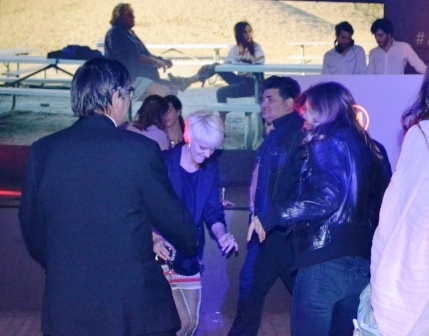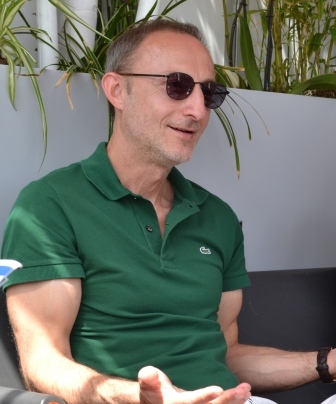The movie seems promising at first. We see the back of a thin woman walking, with determined hard-hitting heels, across the grounds of a hotel, the sun preternaturally bright. When she turns, she is Isabelle Huppert, playing the bereaved mother of a young gay son who committed suicide, for an inexplicable reason. In his suicide note, the son asked his long-divorced parents to meet in Death Valley on a specific date in November, where he promises to make a "sign." Gerard Depardieu, looking enormously fat (he is half-naked for most of the film), shows up and offers a stellar performance as the stolid dad. The film becomes the journey of these two waiting for that "sign" from their son, with Huppert alternately hysterical or emotional, and Depardieu holding down the fort with his calm.
What is most enjoyable in the movie is the Americana kitsch and the setting, filmed from a foreigner's perspective: the Corkscrew Saloon where the couple speak together, the bright supermarket, the hotel pool area and -- especially -- the landscapes of Death Valley. The couple's wandering journey in the hot desert, to "meet" their dead son, has an uncanny portending quality, in a style reminiscent of Peter Weir's Picnic at Hanging Rock (1975) or Gus Van Sant's Gerry (2002).
The caricatures of Americans, on the other hand -- on the superficial level of the "Have a Nice Day" variety -- are annoyingly empty, and do little to help the story along. Other significant faults mar this original film: Huppert, who normally plays an icy mysterious woman, seems to overact when she explodes in tears. And the (over-explicative) lines uttered by estranged mourning parents hardly ever surprise us. "How can we bear the death of a son we brought into the world?" "We don't know anything about our own son." "He brings us to Death Valley, so we spend a week together. A kind of punishment." Predictably -- but sweetly -- the couple rekindles its affectionate bond, but to what end is never truly resolved.
While the story never leads to the "deeper" place it promises, I was gripped throughout, nonetheless, by the supernatural touches: the appearance of ghosts and the strong premise that a violent death leaves traces on this earth. But I have a personal experience in this domain. And a fondness for the appearance of strange ghosts in movies: the deformed girl who appears at poolside is, for me, uncannily sublime.
I asked French director Guillaume Nicloux why he was drawn to making this supernatural desert film.
What inspired this story?
The movie was born by my own experience in Death Valley, by an astonishing shock I had, that was violent. In Mosaic Canyon, something very personal and extraordinary happened to me. My heart and body responded, not my rationality: It was the first time I was completely connected to my emotions.
If you allow yourself to wander and lose yourself in the magical Death Valley, the desert will spur you to delve into your own fears and regrets, and your intimate life. Death Valley had a strong effect on my actors as well: Both Huppert and Depardieu were very affected by the oneiric quality of the desert. It is this interaction between landscape and emotional inner life that fascinates me. After making my film The Nun (2013), I wanted to give myself more honestly to my films.
To create sincerity, which is a paradox as cinema is an act of lying. So this is why it is important to make cinema that lies as sincerely as possible. I wanted to express more intimate and sincere emotions, that affect me personally. Before I framed my films as genres, for example, in the genre of a kidnapping political drama such as in my recent The Kidnapping of Michel Houellebecq (2014).
Why is death so macabre in this film? The haunting son is quite unpleasant: he frightens his parents and is violent with them.
Doesn't death frighten you? Each of us responds to death in a particular way, based on our own sensitivity. My characters feel death violently, because it is their son who died, and because their son has given them an appointment in Death Valley. This is a double shock. It is not in the natural order of things.
This is a couple who once loved each other greatly. This is not an agreeable experience, but I hope that it can lead to another love between them. The morbidity in this film is like pornography, in that it brings up limits.
Did it play a role in this film that Depardieu lost a son himself?
Once I got Depardieu's confirmation to take this role, there was no more need to talk about anything. That is the unique talent of Depardieu. Depardieu is not an actor for me. He is someone who just "is". I do not know any other actor like him who is capable to be like this. Robert DeNiro and Bruce Willis will talk about his unusualness. His authenticity is unique.
How did you work with the DP Christophe Offenstein to create the impress visual look of this film?
I wanted to translate the shock I first experienced in Death Valley and the format that fit best this experience was Cinemascope: It captures in part the mythology. I used the ratio 2,55: 1 that uses the maximum of the frame. When you are in the desert, it is the panoramic frame, the sense of horizontality that counts.
Did you think of Gerry (2002) or Picnic of Hanging Rock (1975) when making this film?
No, but there are points of comparison between Gerry and my film, because in Gerry there are two people getting lost in the desert and in my film there are two people who find themselves.


